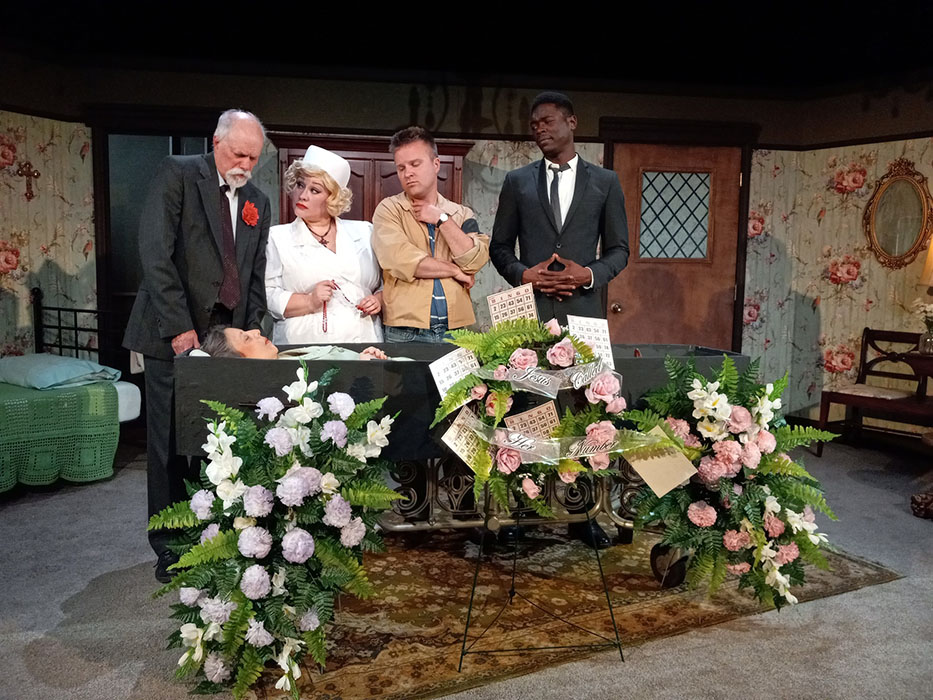For the first two decades of its existence since its initial production in 1965, Joe Orton’s Loot continued to shock audiences with its satiric irreverence toward civic authority, middle-class propriety, the church, the police, and the funeral industry. Even the implication of gay characters was controversial. In a notable production of Loot at NYC’s Manhattan Theatre Club in 1986, there was still breath to be caught at some of this snarling irreverence. However, that shock was in decline, and today, the old dramatic dog that is Loot is all bark and no bite. In 2022, revelations of hypocrisy and abuse in the church are hardly news; dishonesty in policing is a common television crime-show premise; and with the legality of gay marriage, the bulk of western society understands homosexuality is simply a fact of life. So, other than as a chapter in theatre history, what is left to make Loot interesting—or funny—for today’s audience?
Clearly, director Jayne Morgan at the helm of Flying Anvil Theatre’s production of Loot that opened last weekend, understands this dilemma, even commenting on it in the program notes. As a result, she has focused on the play as an example of comedy-farce, pushing the elements of that genre—comic delivery and timing, intricate pacing of entrances and exits, and the essence of visual comedy, the sight gag. Farce, too, requires a constant and sophisticated ebb and flow between clever exposition and delicious comic moments, moments in which characters embrace their own hypocrisy and act as if they really believe the ridiculousness of their actions. And, importantly, farce requires pointed, focused, unhesitating comic line delivery, unfortunately something that seemed to be a challenge for this production.
The audience finds themselves in the parlor of an English house as the embalmed body of the recently departed Mrs. McLeavy (Lisa Silverman) is wheeled in in a coffin as her grieving husband (Greg Congleton) prepares for the funeral. What we discover is that McLeavy’s gay son Hal (Eric Walker) has just robbed a bank in cahoots with the undertaker Dennis (Malik Baines) and the pair must find some place to stash the loot and avoid the ethically challenged detective, Inspector Truscott (Jacques DuRand). Truscott, of course, is nosing around looking for the loot, while Mrs. McLeavy’s nurse, Fay (Kara Van Veghel), a woman with her own history of “inheriting” from dead husbands, has her eye on Mr. McLeavy. Let’s see…what would be a good place to hide the loot from prying eyes?
Kudos go to Mr. Congleton for his well-constructed and delivered character of McLeavy, a man abused and treated with contempt, not just by the civic authorities that he holds in such high regard, but also by Fay and his son. Appearing in Act II with a bandaged head, he masterfully plays into everyone else’s hypocrisy with carefully honed satire and beautifully handles the hilarious expository story of the trip to the funeral, including a car crash, damage to the coffin, and a dog mauling.
I’m sure DuRand’s Inspector Truscott sees himself as some type of Sherlock Holmes, but, for the sake of comedy and satire, is probably more along the lines of a Kafla-esque version of Inspector Clouseau, minus the integrity—and pratfalls. Van Veghel seemed to be keeping a lot of Fay’s juicy badness to herself, admittedly a surprise. Although no longer shocking, I also missed some of the intended comic punch and counter-punch of Dennis and Hal’s “relationship”.
And, although Ms. Silverman has no lines, she receives one of the biggest laughs in the show for her “gymnastic” ordeal—and a lot of well-deserved applause.








